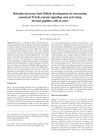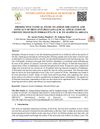 36 citations,
May 2021 in “Nutrients”
36 citations,
May 2021 in “Nutrients” Natural molecules like inositols, resveratrol, vitamins, and omega-3 fatty acids may help manage Polycystic Ovary Syndrome (PCOS), but their effects vary and need more exploration.
[object Object]  11 citations,
March 2019 in “Journal of Medicinal Chemistry”
11 citations,
March 2019 in “Journal of Medicinal Chemistry” Some synthetic carbohydrate receptors, especially compounds 3 and 15, show strong potential for treating Zika virus.
 10 citations,
March 2021 in “Skin health and disease”
10 citations,
March 2021 in “Skin health and disease” COVID-19 patients often have skin issues like chilblain-like lesions and rashes, which can help in early diagnosis and sometimes indicate severe illness.
 6 citations,
December 2016 in “Springer eBooks”
6 citations,
December 2016 in “Springer eBooks” Environmental stressors like UV radiation, pollution, and extreme temperatures can damage skin and lead to diseases and aging.
 3 citations,
May 2021 in “Dermatologic Clinics”
3 citations,
May 2021 in “Dermatologic Clinics” COVID-19 changed dermatology by increasing telemedicine and highlighting healthcare disparities.
 1 citations,
November 2015 in “Indian Journal of Clinical Biochemistry”
1 citations,
November 2015 in “Indian Journal of Clinical Biochemistry” The conference presented findings on how vitamin D levels, genetic factors, and lifestyle choices like smoking and yoga affect various health conditions and diseases.
 16 citations,
December 2021 in “Frontiers in Endocrinology”
16 citations,
December 2021 in “Frontiers in Endocrinology” Sex hormones may affect COVID-19 severity, with estrogen possibly reducing risk and testosterone potentially increasing it.
 January 2023 in “International Journal of Molecular Sciences”
January 2023 in “International Journal of Molecular Sciences” Maxillariinae orchids contain 62 compounds with potential health benefits, including treating skin conditions and diseases like cancer and diabetes.
 3 citations,
February 2017 in “Italian journal of dermatology and venereology”
3 citations,
February 2017 in “Italian journal of dermatology and venereology” Hair loss might be the first sign of dengue fever.
March 2023 in “Italian journal of dermatology and venereology” [object Object]  7 citations,
March 2019 in “Frontiers in Cellular and Infection Microbiology”
7 citations,
March 2019 in “Frontiers in Cellular and Infection Microbiology” Understanding how our bodies interact with mosquito-borne viruses is crucial because there are few treatments and vaccines.
 1 citations,
January 2020 in “Indian Dermatology Online Journal”
1 citations,
January 2020 in “Indian Dermatology Online Journal” Pigtail hair is a sign of new hair growth and should be recognized in hair loss conditions like acute telogen effluvium.
 1 citations,
January 2020 in “Indo global journal of pharmaceutical sciences”
1 citations,
January 2020 in “Indo global journal of pharmaceutical sciences” Citrullus colocynthis and Citrullus lanatus have potential health benefits but may also cause reproductive toxicity.
 June 2017 in “Journal of The American Academy of Dermatology”
June 2017 in “Journal of The American Academy of Dermatology” 7.5% DEET lotion is more effective and safe at repelling mosquitoes than rosemary, citronella, and lemongrass lotions.
 May 2017 in “Journal of The American Academy of Dermatology”
May 2017 in “Journal of The American Academy of Dermatology” Combining microneedling with Q-switched laser treatment for tattoo removal did not improve results and caused more pain.
 May 2017 in “Journal of The American Academy of Dermatology”
May 2017 in “Journal of The American Academy of Dermatology” Finasteride 1 mg/day effectively treats hair loss in men aged 18-41 and over 41; DEET lotion works better than herbal insect repellents; combined tattoo removal technique shows no extra benefits.
 23 citations,
January 2018 in “International Journal of Molecular Medicine”
23 citations,
January 2018 in “International Journal of Molecular Medicine” Baicalin helps hair growth by activating specific cell signals and pathways.
 January 2024 in “Scientific reports”
January 2024 in “Scientific reports” Egyptian Mint effectively kills mosquito larvae and inhibits certain bacteria.
10 citations,
September 2015 in “BMC pharmacology & toxicology” Gloriosa superba poisoning can mimic severe tropical infections and cause rapid hair loss.
111 citations,
February 2017 in “Antiviral research” Researchers found several compounds that could potentially treat Zika virus.
 July 2024 in “Clinical Case Reports”
July 2024 in “Clinical Case Reports” ANA-negative lupus nephritis can be diagnosed and treated effectively with a comprehensive approach.
 April 2022 in “Journal of biotechnology and strategic health research”
April 2022 in “Journal of biotechnology and strategic health research” COVID-19 infection may cause hair loss a few months after recovery.

Hair loss can happen after both mild and severe COVID-19, and areas with more COVID-19 cases may see more hair loss cases.
July 2014 in “Journal of the Dermatology Nurses' Association” The document concluded with a call for article submissions for the 2014 Writing Awards.
 14 citations,
April 2021 in “Clinical, Cosmetic and Investigational Dermatology”
14 citations,
April 2021 in “Clinical, Cosmetic and Investigational Dermatology” COVID-19 may trigger sudden temporary hair loss.
 3 citations,
April 2021 in “Revista da Sociedade Portuguesa de Dermatologia e Venereologia”
3 citations,
April 2021 in “Revista da Sociedade Portuguesa de Dermatologia e Venereologia” Some people who got COVID-19 experienced temporary hair loss starting around 10 weeks after infection, with many seeing improvement within about 25 days.
 January 2024 in “Современные проблемы науки и образования (Modern Problems of Science and Education)”
January 2024 in “Современные проблемы науки и образования (Modern Problems of Science and Education)” Treating post-COVID hair loss leads to full recovery, while not treating it often results in ongoing symptoms.
June 2022 in “Annals of Indian Academy of Neurology” A woman's shingles infection triggered her first episode of a rare neurological disorder and blood vessel inflammation.
November 2022 in “International Journal of Applied Pharmaceutics” Ergostadienol from Moringa seed oil may help prevent hair loss.
 July 2018 in “International journal of research - granthaalayah”
July 2018 in “International journal of research - granthaalayah” Croton tiglium application significantly improved hair regrowth in alopecia areata patients.























